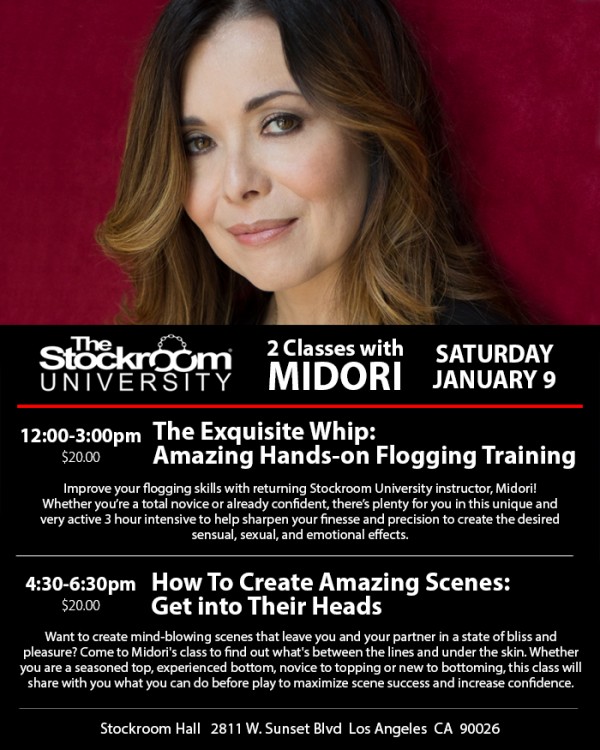This weekend, the esteemed sex educator Midori will be returning to Stockroom University to teach two classes: The Exquisite Whip: Amazing Hands-On Flogging Training and How to Create Amazing Scenes: Get Into Their Heads. For more details on what you can expect from the two classes, check out the Q&A with Midori that we published earlier this week.
As always, The Stockroom is very excited to host Midori, who has long been one of the most insightful people that we know. The below excerpt from her book, Wild Side Sex: The Book of Kink is an excellent example of that. Aftercare is one of the elements of BDSM that is often missed in discussions about technique or negotiation, but as Midori says below, it’s essential to good, safe BDSM, and we’re often not aware of how important it is until it’s not there or done badly.
In my travels in the BDSM/Leather community, I’ve noticed an increasing interest in more intense play. This isn’t surprising as the transmission of knowledge is more geometric rather and linear. A greater number of people are becoming more technically skilled and better informed about BDSM. Leather community conferences, classes, books and the internet have all added to this. This is neither good nor bad. It simply is.

This essay was excerpted from Wild Side Sex: The Book of Kink, available from Daedalus Publishing for $17.99.
As we play harder than ever before, are we recovering, healing and growing better than before? As we seek greater adventures in kinky play, do we remember that the potential jarring to the body, mind and heart may be deeper than before? Are we paying attention to what happens after a scene, not just how to create one that’s technically proficient? Are we minding our aftercare as well as we should?
I realize that aftercare isn’t as sexy of a topic as say, double-handed flogging, Master/slave protocols, suspension bondage, etc. Thus we don’t see it talked about often in educational series or discussed in depth. We know we need it, but we don’t dwell on it. We treat it like flossing our teeth. “Yes, yes, we know…” Unfortunately the reality is that the presence or absence of aftercare, and its timing, quality and sincerity of aftercare can make the difference between a fantastic scene and a miserable experience. It’s as necessary as air or water; similarly vital, yet taken for granted until it goes missing or quality is degraded.
There are several different varieties and phases of aftercare.
At the most basic is the human courtesy to acknowledge the end of the scene and the other’s contribution to both of your experiences. Suddenly halting a scene without cool down or mutual sense of closure can feel as jarring as getting rear-ended while cruising along the freeway at 70mph. Whatever wonderful experience you may have been having is now wrecked. Regardless of the pleasure they took during the experience, the other person is uncertain as to the reason for its end and may take the blame or resent the other. You wouldn’t screw a person, cum and just withdraw your organ and leave without saying anything, would you? At least you’d say “Bye.” Just because a person is a submissive, a masochist, a sadist or a dominant doesn’t mean they don’t respond as any other person would to moments of intense intimacy. BDSM for some is more intimate then sex.
Aftercare Phase 1: Physical Recovery
Another basic level of aftercare is the physical recovery. This is when we put Humpty Dumpty together again. If there are cuts, clean them and cover them. If the body is cold, hungry or hurt, fix it. Most people find it appropriate to stay with the person long enough to make certain that they are able to operate heavy machinery, i.e. their car. For some, this recovery time is a matter of minutes, for others it might take a few hours. This is all common sense stuff. Other than specific first aid, possible medical information and willingness to hang out while the ‘high’ wears off, not much is needed to figure out thus far.
Let’s call all this Phase 1 of Aftercare. It’s the immediate and basic physical recovery and emotional cool-down time. If you’ve been playing for a while you’ll probably have a general idea of how you like your aftercare. It’s really a matter of personal preference. Some like lots of physical contact while others do not. Some are very chatty and others prefer quiet. Some want to spend time with their play partner, join others or be left alone. Some take a long time, while others bounce from one scene to another scene or engage in a new activity with barely a breath. Since aftercare needs vary so much, I highly suggest that you take inventory of how you like your aftercare and mention it to your play partner. The general duration of your after care should be built into the overall timing consideration for a scene. If you generally need 2 hours for aftercare and you only have 3 hours together, then that leaves an hour for play. Failing to plan this might leave one or all players out in the cold without good aftercare. If you have 3 hours together and you play for 2 hours and 45 minutes, and then two hours of aftercare isn’t going to fit into 15 minutes. That makes for a very difficult transition from the land of pleasure and fantasy to the harsh reality of driving home.
Here’s a jewel of a little kinky sex secret: Fantastic aftercare, (what that is varies from person to person of course) can make a mediocre scene seem glowingly wonderful. A terrible aftercare experience or absence of aftercare entirely can turn an amazing scene experience into a horrible one. Now you see why it’s worth investigating what your partner’s aftercare needs are. It might be the difference between you being a stud or a dud.
For some folks, good sex is good aftercare, or even the goal of the whole experience! And that’s just wonderful! For others, they have no interest in aftercare of the other person and that’s just how they are. Does that make them a bad BDSM person? That depends on how they deal with their preference. It’s perfectly fine to state, during negotiation for play, that they don’t provide aftercare. Then it’s out in the open and the other person can choose how to proceed. Maybe they choose not to play or choose to play anyway. Maybe the other person will forgo aftercare or arrange to get it from someone else. If, however, the person who won’t provide aftercare fails to mention that in advance and the scene ends in totally conflicted aftercare expectations, we have a problem.

Aftercare Phase 2: Check-in
Let me introduce to you Phase 2. We in the leather community often talk about a “check-in call” the next day. Why is this needed and what is accomplished by this? What really needs to take place in this conversation? How should the check-in call be conducted? Well, since I’m not one to legislate behavior, I’ll simply bring up some thoughts and ideas on this.
It’s quite common with kinky play, whether it’s physically or emotionally intense, to feel a huge adrenaline rush and shift of neural chemicals of various sorts during play. (Well, actually, I hope this happens most of the time for you. After all, the adrenaline goes hand in hand with pleasure.) As the scene closes and we “return to earth,” the level of adrenaline, endorphins, serotonin and other yummy body chemicals come down. Sometimes it’s a nice slow easing off from a state of ecstatic pleasure, leaving us in a place of soft contentment. Sometimes the shift is fast and sudden enough to leave a person’s body and mind in a state much like a miniature version of shock. In theory, if this mini shock can happen during the basic, post-scene physical care and maintenance level of aftercare, then it’s all groovy. We can take care of it right along with the bruises. Unfortunately, human behavior rarely follows theory. When and how we come down from the “high” of flying in a wonderful scene is not entirely predictable. More experienced players have enough personal data to know their general patterns, but there’s always room for surprises. Sometimes we are moved deeper and fly higher than either party expected. So, it’s not uncommon that we experience a “drop” the next day, or for that matter, several days after the scene. This may leave us in various states of emotional dishevelment. Various feelings may arise after personally or physically significant scene experiences: Anxiety, moodiness, agitation, anger, lethargy, loneliness, fatigue, disorientation, indecisiveness, etc. etc. Needless to say, this is not a fun place to be in. Check-ins are a way of grounding us back to calm and solidity when the storm of feelings uproot us.
A check-in call gives a chance for the players to connect after bit of time has passed during which post-scene emotions have emerged and been processed, or at least have begun to be processed, after a scene. It may be that both parties are perfectly fine and they had a nice “soft landing” without feelings getting stirred up. If that’s the case, then great! Then the check-in call can serve as way to thank one another for the shared pleasure, trade compliments and express your pleasure with the experience. If it’s considered polite to call to thank the host after a dinner invitations, it’s certainly polite to do so after such an intimate invitation as one for BDSM play. If all is good, you may also use this call to set up a potential follow-up date. If one or both people are feeling a drop from a scene, however, the check-in call becomes more important. Sometimes, a simple expression of reassurance, gratitude and validation from the other person may relieve the post-scene blues. We all seek validation, affection and a sense of worth. The body chemical drop may amplify the profound vulnerability created in play, carrying it over to the next day. The emotional nakedness that the person experienced may leave them anxious about potentially being judged negatively, or worse, of being rejected. These concerns are often soothed by the conscientious play-partner in the check-in call. The conversation also gives the caller more insight into the psychological structure of the other person—critical pieces of information for creating hotter scenes or safer experiences with them in the future.
What if we have the check-in call and need to say things that aren’t all great? What if something bad happened in the scene and you’re not happy or feel somehow endangered or mistreated? What if you felt that it wasn’t what you wanted after all? What if physical problems came up that needed medical attention? What if you have to listen to a negative post scene conversation? It happens. We need to get tools to deal with this.
First of all, we’re all adults. Whether or not the scene went well, both people entered into it as equal human beings with consent. If one felt that they had no power to consent to entering into the scene, then this is no longer BDSM. It just might be called abuse. Since both have consented, both have accepted responsibilities. If a scene didn’t work out, before you complain or blame, you have to take inventory. Where did it go wrong? Who shares the responsibility, and how? Were communications clear enough? Did the two of you mean the same thing by the terms used?
Some questions you might want to ask yourself before going into discussing the scene that didn’t work…
- What am I feeling?
- When did that feeling start?
- Did I assess my needs, wants and limits clearly before playing?
- Did I communicate these needs, wants and limits clearly before playing?
- Did I understand the other person’s needs, wants and desires clearly?
- When things went wrong, did I communicate that to the other person once I realized it?
- Was the bad thing that happened part of what I considered acceptable risk in this scene?
- Was my appetite greater than my ability to fulfill it?
- What was my intent in the scene?
- What was the other person’s intent in the scene?
- How big of a deal is this negative experience relative to the whole scene and / or relationship to the person?
- What further care do I need to feel whole or complete again?
- Did I communicate my aftercare needs to my partner before the scene began?
Remember to talk about how you are feeling. “I’m feeling down after our scene” is very different then “You made me feel crappy from that scene.” Don’t make blaming statements. Speak with compassion, and remember that it’s very difficult for the other to feel judged or criticized. They may be just as raw and vulnerable as you are. Whatever you do, don’t hold in the negative feelings and resent them in silence. It’s not fair to the other person or yourself if you deny the chance to clear the air and gain better understanding. It’s also very childish.
Have you noticed that I’ve been generally avoiding the use of the terms top, bottom, dominant or submissive so far? One might think that aftercare is only for bottoms and submissives, but it’s also for tops, sadists and dominants. Tops go through similarly intense changes in their body chemistry, leading to the potential shock-like emotional and physical crashes. Beyond the fundamental physiological concerns, most often the top has their sense of Self and self-worth wrapped up in the scene as much as the bottom does. In the act of sadism or dominance the top has exposed their desires and hungers, which aren’t necessarily socially acceptable. We’ve been taught not to hit those we love. Now we do it for fun. It can take a bit of mental contortion to reconcile the cognitive dissonance with this. Many tops want to know that they are still loved and desired after exposing their darker desires. Their pride as a technician and lover may also be involved in this. The top wants validation that they were a “good top.” Telling a top that “Your flogging sucks” just might crush them. Even if they look pissed off, they’re actually hurt. You might not get another date or you may have stunted their growth as a top with such a statement. Instead you might want to say: “Thanks for flogging me! I think maybe that flogger’s a bit too much for our scenes. Let’s go shopping for a new flogger just for us.” (Then you go and get a good practice flogger you like that they can’t damage you with if they tried.)
Here’s an interesting insight into Top psychology: there are times when the bottom needs very little aftercare, but the top insists upon it. For many tops, providing aftercare for the bottom may be exactly the aftercare that they need. The act of providing help and healing allows many tops to feel whole, compassionate, kind and validated. This may be how they balance for the darker side that they expressed earlier in scene. So what do you do if you’re the bottom and you feel like you’re done with your aftercare but the top is still fussing over you? If you can, let them, and understand that you’re doing their aftercare in letting them provide for you.
Not all aftercare needs to happen with the person you played with. It may not be possible or it may not be desirable. If you hooked up with someone at a bar and played in the back alley or at a sex/BDSM club, you may not have their contact info. You may not even want to know their name. You may have hired a professional dominant but you don’t want aftercare with them. You may be a professional dominant and can’t contact your client for aftercare for them or yourself, or you may find that’s beyond the professional relationship the two of you set up. For so many reasons, aftercare doesn’t have to be with the person you played with.

Aftercare Phase 3: Deeper Aftercare
Maybe you didn’t realize you needed deeper aftercare until well after your partner was unreachable or reasonably available. Or maybe you need therapeutic attention. If you need special aftercare, you need it, and there’s no question about that. Now we’re getting into Phase 3 – the tar pit of emotions that can bubble up once in a while with BDSM play. Phase 3 doesn’t always happen but it can and if not dealt with, it’ll swallow you up or get in the way of your relationship with the other person. This is one of the many reasons why it’s important to have folks in your life with whom you can talk about your kinky life. You have to figure out how much aftercare you can reasonably ask of that third party caregiver. Sometimes the care you need may be deep enough for you to consider a therapist or other professional listener/healer/consoler. Some issues that can come up with play may be simply beyond the capability of your play partner or third party.
Maybe you engaged in intense play as a performance or commercial exchange. You might do live BDSM shows on stage or via the Web, you might be shooting a BDSM porno video, you might be doing a show on a fetish event stage. Is there a responsibility for aftercare in such a situation? If so, where does it lie? A producer has certain expectations of professionalism on the performer’s part. Yet they are dealing with human beings in very intense situations. Even the military has built-in means for post-combat emotional care. At a strictly Machiavellian level, isn’t it in the best interest of the commercial producer to clean up the state of mind of the performer as they would clean up the video footage and equipment afterwards? Or is it?
Something for all of us to ponder…






